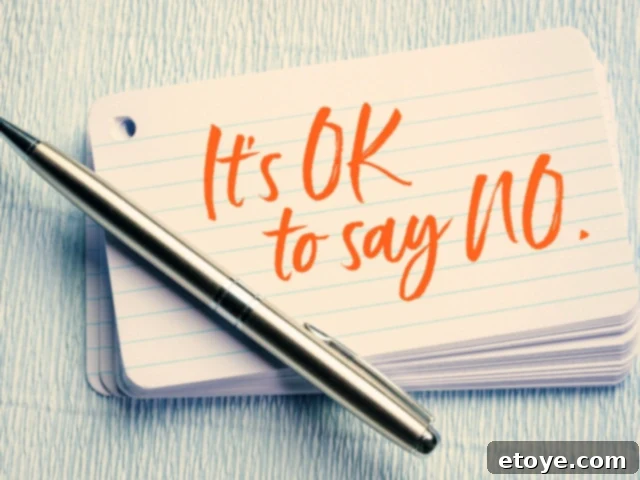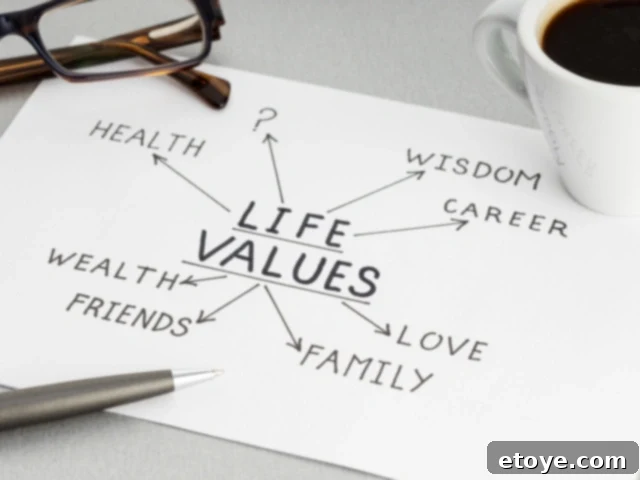Welcome to the New Year! The confetti has settled, the last of the holiday cheer lingers, and a fresh slate beckons with possibilities. For a brief, glorious moment, it feels like anything is within reach. Yet, this hopeful feeling often dissipates as we quickly find ourselves overcommitting, stretched thin, and saying “yes” to obligations that drain our energy and leave us feeling overwhelmed. This year, it’s time to chart a different course. Let’s intentionally move away from the chaos and embrace a calmer, more deliberate way of living. And the cornerstone of this transformation? Mastering the art of boundary setting.

Why Is Boundary Setting Crucial for Your Well-being?
Think of boundaries as the essential fences for your personal life. These aren’t meant to isolate you or keep others out, but rather to safeguard what you hold most dear: your mental health, emotional well-being, personal space, and precious time. Without clear, defined boundaries, we inevitably spend an exorbitant amount of energy on activities, people, and commitments that deplete us. This leaves us with precious little left for what truly nourishes our souls: our own needs, continuous personal growth, and the deep, authentic relationships that genuinely enrich our lives.
It’s perfectly understandable to feel that setting boundaries is a daunting task. This is particularly true when it involves close family members, dear friends, professional superiors, or other authority figures. The thought of those potentially awkward conversations can be enough to make us hesitate. But let me assure you, the benefits of establishing healthy boundaries are unequivocally worth every moment of discomfort. The small bits of time and vital energy we relinquish because we find it uncomfortable to decline a request or set a limit accumulate at an astonishing pace. Once given, this time and energy cannot be retrieved. Therefore, do your future self an immense favor and begin the practice of setting personal boundaries now. It’s an investment in your peace of mind, your energy levels, and ultimately, your happiness.

Embracing the Power of Saying No: A Path to Self-Preservation
If the whirlwind of the holiday season taught me anything, it’s that the simple act of saying “no” is not selfish; it’s an act of profound self-preservation. Whether it’s gracefully excusing yourself from a third round of family gatherings, declining another invite to a sprawling social event that promises more stress than joy, or choosing to opt out of a demanding work project, saying no isn’t about rejection. Instead, it’s about actively creating vital space for what you truly value. This might manifest as much-needed alone time, quality moments with your absolute favorite people, a deeply deserved nap, or simply uninterrupted time for your hobbies and passions.
In a world that constantly demands more of us, remembering this truth is crucial: every “yes” you utter to another person or obligation is, in essence, a “no” to yourself. It’s a choice to prioritize someone else’s request over your own well-being, your own needs, and your own precious resources. And frankly, my dear, you absolutely deserve better. You deserve to honor your capacity, protect your peace, and consciously allocate your energy to what truly matters to you. Saying no is not an act of unkindness; it is a declaration of self-respect and a fundamental tool for maintaining your personal equilibrium.

Your Essential Guide: How to Set Clear and Healthy Boundaries
Setting boundaries is a skill, and like any skill, it improves with practice. Here’s a structured approach to help you define and uphold your limits:
- Get Crystal Clear on Your Needs: Before you can effectively communicate or enforce any boundaries, you must first deeply understand what those boundaries are. Take dedicated personal time for introspection. Journal, meditate, or simply sit in quiet reflection to identify what specific situations, interactions, or commitments consistently drain your energy. Is it the incessant barrage of work emails after hours? The pressure to always be available on social media? Ambiguous work expectations that bleed into your personal life? Or perhaps certain family dynamics that leave you feeling depleted? Pinpointing these energy leaks is the critical first step toward proactively protecting your mental and emotional reserves. Knowing your limits is the foundational step toward defending them.
- Communicate Openly, Honestly, and Respectfully: Once you’ve identified your boundaries, the next vital step is clear communication. Honesty, tempered with kindness, is paramount. Whether you’re speaking with a romantic partner, a colleague, a close friend, or a well-meaning but occasionally overbearing family member, use direct, clear “I” statements to articulate your needs without placing blame. For instance, instead of saying, “You always expect too much from me,” try: “I’ve realized I need more time to recharge and focus on my personal well-being, so I won’t be able to commit to our weekly dinner plans this year. I hope we can find another way to connect that works for both of us.” This approach focuses on your feelings and needs, making the boundary about you rather than an accusation against the other person.
- Be Unwaveringly Consistent: A boundary, no matter how well-defined or clearly communicated, is only as effective as your commitment to enforcing it. If you’ve decided to limit responding to work emails to specific business hours, stick to that decision diligently. If you’ve committed to a certain amount of personal time each day, protect it fiercely. Initially, people around you might test these new limits, either consciously or unconsciously, simply because they are accustomed to your previous patterns. However, with consistent enforcement, they will gradually learn to respect your boundaries. This consistency not only solidifies your limits in the minds of others but also reinforces your own self-respect and prevents you from feeling like a doormat, constantly accommodating others at your own expense.
Navigating the Waters of Boundary Guilt
One of the most pervasive obstacles to successful boundary setting is guilt. Many of us, particularly women, have been socially conditioned to prioritize the needs, feelings, and expectations of others above our own. This deeply ingrained pattern can make the act of setting a boundary feel inherently selfish or unkind. However, it’s crucial to reframe this perspective: healthy boundaries are not detrimental; they are the very foundation upon which healthier, more respectful relationships are built. When you consciously respect your own limits and needs, you are simultaneously modeling and teaching others how to treat you. This creates a positive ripple effect for everyone involved.
In my personal experience, something truly transformative occurs when you become more resolute and transparent about your needs and the way you communicate them. This directness alleviates the pressure on others to constantly guess your comfort levels or anticipate your unspoken desires. It puts an end to the stifling, awkward dance of mutual “Is this okay? Are you okay? How can I make you feel okay?” inquiries that often characterize indirect interactions. When you are able to communicate clearly and authentically express your true self, it not only puts you at ease but often has the same calming effect on others. It can even inspire them to feel secure enough to share their own needs and boundaries. This fosters an environment of straightforward transparency, eliminating guesswork and reducing trial-and-error in relationships. The result? More genuine connections built on mutual understanding and respect. So, in essence, setting boundaries isn’t just a favor to yourself; it’s a gift you extend to others, creating space for more meaningful interactions.
If feelings of guilt inevitably creep in, gently remind yourself that saying no doesn’t make you an unkind person; it makes you an intentional one. It’s about creating essential room for what genuinely matters in your life, rather than stretching yourself beyond your capacity trying to fulfill every single demand placed upon you. As the timeless adage wisely states, “You cannot pour from an empty cup.” Prioritizing your own replenishment is not selfish; it is sustainable.

Aligning Your Life with Your Deepest Values through Boundaries
While often associated with declining invitations or requests, boundary setting is far more expansive than simply saying no. Crucially, it is also about enthusiastically saying “yes” to the things that truly resonate with your core values and aspirations. Are you striving to carve out dedicated time for healthier eating habits, pursue a budding passion project, or maintain a more equitable work-life balance? Boundaries are the indispensable first step in meticulously aligning your daily actions and commitments with what you value most in life.
Embrace this upcoming year as a powerful opportunity to integrate personal boundaries as an essential form of self-love and self-care. Do you desire more quality time and deeper connection with your partner or children? Proactively block off those evenings in your calendar and guard them fiercely. Do you need to protect your emotional health from draining interactions? Consciously skip the toxic group chat or unfollow social media accounts that leave you feeling negative. Life is unequivocally too short to spend it perpetually pleasing other people at the significant expense of your own happiness, mental peace, and personal fulfillment. Your well-being is not a luxury; it is a fundamental necessity, and boundaries are the tools that help you secure it.
Debunking Common Myths About Setting Boundaries
Let’s clarify some pervasive misunderstandings surrounding boundaries:
Myth #1: Boundaries are inherently selfish.
Boundaries, in their purest form, are a healthy and respectful means to ensure that everyone’s needs – including your own – are acknowledged and met. What is arguably more detrimental or “selfish” in a subtle way is not being honest with others about your true self, your capacities, or what you genuinely desire. When you begin to reframe people-pleasing behaviors for what they often truly are (a form of dishonesty or avoidance, driven by a desire to be liked or maintain an artificial peace), you start to understand that saying yes to absolutely everything is actually a profound disservice to both yourself and to others. Authenticity, even when it involves setting limits, fosters deeper, more genuine connections.
Myth #2: Setting boundaries will push people away.
On the contrary, well-defined and healthy boundaries often strengthen relationships by fostering an environment of mutual respect, clear understanding, and reciprocal honesty. If someone consistently refuses to acknowledge or respect your thoughtfully established boundaries, it’s a strong indicator that the fundamental respect and understanding might be lacking in that relationship. In such cases, it prompts a crucial question: is this truly the kind of person you wish to maintain a close relationship with, especially if they are unwilling to honor your basic needs for self-preservation?
Myth #3: Once set, boundaries are permanent and unchangeable.
This is a misconception. Boundaries are fluid and should absolutely evolve as your personal priorities shift, your life circumstances change, and you grow as an individual. What worked effectively for you last year might no longer align with your goals, energy levels, or personal needs for the current year, and that is perfectly acceptable. Periodically reassessing and adjusting your boundaries is a sign of self-awareness and healthy adaptation.
Myth #4: Boundaries are about dictating other people’s behavior.
This is a crucial distinction. Boundaries are fundamentally about defining what you, as an individual, will and will not accept, tolerate, or participate in. They are not a mechanism for controlling the actions or choices of others. For example, an ineffective boundary would be, “You can’t speak to me in that disrespectful tone.” A truly healthy and empowering boundary, focused on self-management, would be: “If you continue to speak to me disrespectfully, I will remove myself from this conversation.” The critical focus here is on your actions and your limits, which keeps the boundary respectful, actionable, and entirely within your personal control.

Practical Examples of Boundaries Across Different Aspects of Life
The specific manifestation of boundaries can vary significantly from person to person, reflecting individual needs and circumstances. Here are some tangible examples to inspire your own boundary setting:
- Work Life: Establish clear limits on professional communication by refraining from responding to work emails or messages after specific business hours. Alternatively, learn to politely decline additional projects that threaten to disrupt your crucial work-life balance. A practical example might be, “I will not respond to work-related communications after 6 PM, Monday through Friday, to ensure I have time to fully disengage and recharge for the next day.”
- Family Dynamics: Navigate complex family situations by politely yet firmly declining involvement in drama or setting explicit limits on holiday and social commitments. For instance, you could communicate, “I’d love to attend one holiday gathering this year to celebrate with everyone, but I won’t be able to make all three events.” This manages expectations while still showing care.
- Social Media & Digital Life: Implement regular digital detox breaks or actively mute/unfollow accounts and individuals that consistently trigger negative emotions or impact your emotional health. Limiting your daily scrolling time to a predetermined duration can liberate a significant amount of precious mental space and reduce comparison fatigue. Consider an “unplugged hour” before bed.
- Daily Personal Life: Consciously schedule dedicated time for yourself each day, whether it’s for engaging in leisurely reading, pursuing physical exercise, practicing mindfulness, or simply savoring a cup of coffee in tranquil solitude. Treat these blocks of personal time as non-negotiable appointments, just as important as any professional meeting. This commitment reinforces your self-worth and creates consistent moments of replenishment.
Effectively Handling Pushback to Your Boundaries
It’s an undeniable reality that not everyone will immediately embrace or appreciate your newly established boundaries, especially if they are accustomed to your previous pattern of always saying yes. When you encounter resistance or pushback, the key is to remain calm, centered, and firm in your resolve. Gently remind the other person that your decision isn’t a personal affront, but rather a conscious choice to honor and protect your own essential needs. For example, you might say, “I understand that my decision might be upsetting to you, but I genuinely need to focus on prioritizing my mental health and well-being at this time.”
Another powerful strategy is to frame your boundary in a way that subtly highlights mutual respect and benefit. For instance, you could articulate, “I deeply value our time and connection, and by setting these boundaries for myself, it actually means that I can be more present, engaged, and fully enjoy the time we do spend together, rather than feeling overwhelmed or resentful.” This approach helps the other person understand that your boundaries are ultimately conducive to a healthier, more fulfilling relationship for both parties, rather than a punitive measure.

The Profound Benefits of Embracing Healthy Boundaries
The positive ripple effects of consistently setting and maintaining healthy boundaries are truly extensive and transformative. You’ll experience a significant reduction in stress, a marked increase in your energy levels, and the invaluable capacity to channel your focus toward meaningful personal growth and development. This practice empowers you to cultivate healthier, more authentic relationships built on mutual respect. You’ll find yourself achieving new goals, pursuing long-held aspirations, and ultimately living a life that feels profoundly authentic, aligned with your true self, and deeply satisfying.
Boundary setting also serves as a powerful catalyst for developing greater emotional resilience. When you possess crystal-clear clarity about your personal limits, you dramatically reduce the time and energy you expend on unnecessary conflicts, frustrating misunderstandings, or burdensome obligations that simply do not serve your highest good. This proactive approach frees up mental and emotional bandwidth that can then be redirected towards more constructive and enriching endeavors.
Furthermore, when you consciously establish boundaries, you are sending an incredibly powerful and unequivocal message, both to yourself and to everyone around you: your time, your energy, your emotional well-being, and your overall health matter deeply. This profound affirmation of your intrinsic worth builds immense confidence and steadfastly reinforces your sense of self-esteem, making it progressively easier to prioritize what genuinely aligns with your core values and life purpose.
Healthy boundaries also create a positive ripple effect that extends beyond your immediate self. As you consistently model self-respect and commit to robust self-care, you inadvertently inspire and empower those within your sphere of influence to adopt similar practices in their own lives. It truly becomes a win-win scenario for everyone involved, fostering a culture of mutual respect and well-being.
Recognizing and Adjusting Unhealthy Boundaries
It’s important to acknowledge that boundaries can sometimes inadvertently veer into unhealthy territory. This might manifest as shutting people out completely, isolating yourself, or paradoxically, overcommitting to avoid the very guilt you’re trying to escape. Signs of unhealthy boundaries often include chronic feelings of resentment, persistent burnout, or a consistent sense of being misunderstood by others. Taking time for honest self-reflection on these recurring feelings can be incredibly insightful, helping you identify precisely where adjustments are needed in your approach. If you notice these patterns emerging in your life, it’s a clear signal that it might be time to reassess your current boundaries and perhaps explore more balanced and healthier ways to define your personal space and interactions.
The Transformative Power of Starting Small
If the concept of overhauling your boundaries feels overwhelming and daunting, take comfort in knowing that the most effective approach is to begin small. Identify just one specific area in your life where you genuinely wish to implement a change. This could be as simple as practicing saying no to last-minute social plans that disrupt your evenings, or consciously carving out a mere 30 minutes of uninterrupted, dedicated time for yourself each day. These small, seemingly insignificant victories will gradually build your confidence, generate positive momentum, and make it progressively easier to expand and solidify your boundaries across more areas of your life over time.
Starting with small, manageable steps also refines your ability to understand, articulate, and enforce your needs more effectively. The more frequently you engage in this practice, the more accustomed and comfortable you will become. You’ll discover that what once felt incredibly difficult will, with consistent effort, transform into an increasingly natural and effortless part of your self-care routine. Each small boundary set is a step towards a more empowered and peaceful you.

How Will You Embrace Boundary Setting This Year?
If traditional New Year’s resolutions don’t quite resonate with you, consider embracing boundary setting as a powerful, actionable alternative. It is, perhaps, the single most effective strategy you can adopt to genuinely reclaim your invaluable time, protect your vital energy, and cultivate a profound sense of inner peace. This year, consciously choose to say a resounding “yes” to calm over chaos, and to living with intention rather than reacting to external demands. Simultaneously, courageously say “no” to everything that no longer genuinely serves your well-being or aligns with your deepest values.
How will you actively practice boundary setting in your own life this year? I am genuinely eager to hear about your plans and insights. Please feel free to share your thoughts and strategies by leaving a comment below!
